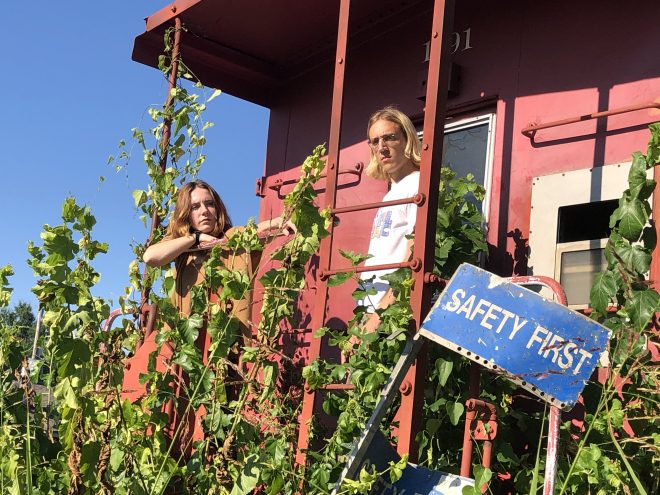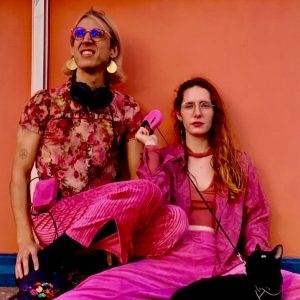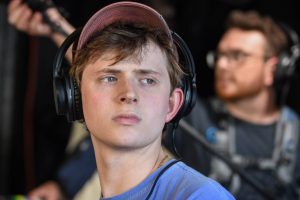Q&A: Moving Up with Reward Center

Arkansas natives Maddie Robinson and Josh Wyatt don’t balk at reinvention. Debuting as Something Better in 2017, before transitioning for a spell to a three-piece lineup as Sleepover., the husband-and-wife duo craft alt-folk endowed with the rootsy oddities of Big Thief and the confessional lyricism of Alex G. With their latest rechristening as Reward Center, Robinson and Wyatt have made the brave leap many Arkansas musicians dream of: moving to the Big Apple.
Still, through all the changes of name and location, Reward Center maintain their original impulse to scrutinize what keeps humans pressing on in our Sisyphean hamster wheel of life. Though Robinson and Wyatt’s sun-dappled folk-rock can sound carefree, their lyrics probe at the vices humans fall prey to, from psychoactive drugs to media oversaturation. We live with a world of extremes constantly at our fingertips. Reward Center are ever curious as to why we seek to distance or desensitize ourselves to it and at what point survival mechanism becomes inhibition.
Their debut album as Reward Center, Drive Careful, You’re Carrying My Heart, out September 10, contains Robinson and Wyatt’s most ambitious music to date. Single “Happiness Juice” opens like a Something Better song, with Robinson’s craggy vocal coasting over homespun guitar strumming. Before long, synths shatter the idyllic façade, elevating the song into psychedelia—terrain the duo returns to throughout the album. “No Big Deal,” a personal favorite, is a goosebump-inducing synth orchestration that gives way to a cloud of noise. The Idle Class has kindly been given exclusive access to the song, which you can listen to below.
Where Something Better songs were the perfect soundtrack for driving down Arkansas’s winding treelined backroads, Reward Center is better-suited for spreading a picnic blanket in a cow pasture and gazing at the stars. A week before their big move to NYC, Robinson and Wyatt gave The Idle Class the scoop on the new album, their point of view as songwriters, and what it feels like to go from quarantine’s isolation to moving to the largest metropolis in the United States.
THE IDLE CLASS: Where does the name, Reward Center, come from?
JOSH WYATT: Reward Center feels meaningful because it’s the part of the brain that deals with rewards and stimulation and craving, wanting, yearning. It felt especially poignant during the pandemic. Everyone’s reward centers were going haywire. We weren’t getting stimulated in the ways we once were, and so we needed to seek out new forms of stimulation or come together in whatever way we could.
IC: Can you tell me about your upcoming eight-track album, which will be your first as Reward Center?
MADDIE ROBINSON: Yeah, it’s something we made isolated during the pandemic. It’s definitely more in-between genres. It’s not trying to be any certain kind of thing. It’s my favorite music we’ve ever made.
JW: We made about 16 songs or so at first….We weeded out some of the rockier, not as hard-hitting songs to land on eight….[I]t made it feel like more of an album, rather than just like a compilation of different ideas and songs that we were putting together. Chris Moore at East Hall Recording Studio brought out all of the sonic beauty.
MR: It’s twice as loud as our Something Better songs.
JW: Even though we made these songs for ourselves, we certainly have the intention to perform them. Live performance is really our favorite part about making music. It’s a magical feeling to share music that can unify a room full of people.
MR: There’s a lot of samples, which is something we never did a lot of. We include a couple of voicemail messages. On the full album, “Can’t Change” is going to have this voicemail from my grandfather at the beginning. It’s really funny because he’s telling me, “Hey, Maddie, it’s grandpa. I listened to the new song. That song is so beautiful. You should sell that song to a big artist who can make money off of it.”
JW: It’s interesting to hear that perspective that money is king over everything else to where it’s like, “Well, if you’re going to do music, then you should try and get money for it.” And it’s like, “Why?” That’s not the goal here.
IC: What inspired the album title, Drive Careful, You’re Carrying My Heart?
MR: I said that to Josh one morning half-asleep.
JW: Yeah, I was going to work, and she was still asleep. And I said, “Bye,” and she said, “Drive careful, you’re carrying my heart.”
IC: So far you’ve released three singles: “Happiness Juice,” “Can’t Change,” and “Watch TV.” What are your favorite songs from the album?
MR: Part of writing 16 songs and then paring it down to eight is that I love all of these songs equally. I’m sure that not everyone will, but I can’t really pick a favorite.
JW: It’s crazy to see the arc [these songs] go through in your own mind. It’s crazy that nobody has heard these songs, but I’ve listened to them each a thousand times, over and over and over again. I’ve picked out all the good parts, all the bad parts, changed them time and time again, gotten them the way we like and then got them mastered and was even more stunned. The song I’m most proud of, personally, is “Can’t Change” because I feel like I reached a new height for my singing abilities.
IC: “Happiness Juice” is a sad summer song, which is something I always look for to soundtrack the dog days of summer. Where did the lyrical inspiration come from and does “happiness juice” refer to alcohol?
MR: It actually refers to CBD, which is pretty tame. I used to work at a CBD store, so we had a ton of CBD. I don’t even like this stuff, but I was at home one day, dealing with some family drama or something and I was feeling sad. And then I was like, “Okay, what can I take to make myself not feel sad?” I had half a bottle of bourbon that I used to make a bourbon pecan pie one time, CBD, and weed. I was thinking to myself, “What can I take to make me feel good?” And then I thought, “That’s so weird. Like, I’m just trying to get some sort of quick fix for that feeling.”
JW: A concrete solution for an abstract feeling.
MR: Exactly. It showed me how so many people are trying to get a quick fix for their problems, but it never really works. CBD just makes you sleepy.
JW: I wrote the second verse of that song. The idea behind the song is grasping for a better state of mind than the one you’re in, but ultimately realizing the futility of that. The best thing to do for your own state of mind is to accept it, accept whatever you’re going through and get comfortable with it.
IC: Yes, and when you struggle to not feel upset, that becomes another struggle in and of itself. I notice that you two are drawn to emotional turmoil and stagnation as a source of lyrical inspiration. Is that accurate?
MR: Interestingly enough, you tend to write songs when you’re sad. When you’re happy, you’re out doing stuff. You’re out seeing people, hiking, making art. When I’m sad, I cope with it by writing a song. It’s funny—if you went solely off our music, you would think we’re super fucking depressed all the time.
JW: [Songwriting] is an amazing tool for understanding the things that you’re going through on a deeper level and for finding common ground and camaraderie with other people who are going through a similar experience.
MR: It’s interesting. Indie music tends to be sad. It can be hard to write a happy song.
JW: But it’s really fun to have the cadence and sound of happiness juxtaposed against the lyrical content of sadness. That’s something that we really enjoy doing. “Watch TV” is very bright and cheery, but the lyrics are about wanting to do nothing but watch TV, and celebrating that, but also showing how that’s an escape that we all rely on, especially recent generations, like the TV generation and the internet generation. We almost all feel this intrinsic introvertedness because of our exposure to technology and the way we crave it. During moments of high stimulation from other people, we want to get back to that low stimulation.
IC: That’s a big theme I see recurring throughout your work: finding an escape or a palliative to deal with the intensity of being human. I think of Sleepover. songs like “Stupid Kids” or “Hospital,” which has this lyric about needles on the floor.
MR: It’s almost like existence is inherently traumatic at this point.
IC: I mean, we are in a global pandemic! Combine that with the social alienation of social media and technology, our generation is going through an unduly amount of psychological strain.
MR: I’m reading this book called Sapiens, which explores early civilizations and how we’ve changed our way of living too quickly for us to evolutionarily catch up. We’re geared toward a lifestyle where you only interact with 150 people on a daily basis or even your entire life. You only know that many people, and you only have one or very few other options of what to be and what to do every day. It used to be all laid out for you, and you just had to try and find food and survive. Fast forward to our time and the question of what are you going to do with your life. If you asked a hunter-gatherer that, they’d be like, “What do you mean?”
JW: When you surpass the 150-mark of people you interact with, which we all do now for the most part, it gets really rocky. What unifies people beyond that level nowadays is mythology, the stories of different things that we subscribe to like culture, religion, identity, sociopolitical whatever. But those [mythologies] are really rocky and they’re really subjective and they’re constantly changing.
IC: You two have been involved in the Memphis, Fayetteville, and Little Rock music scenes under the various iterations of your band. How do the scenes compare?
Maddie Robinson: Memphis was super rap- and metal-focused. I love rap, but as far as what we make, occasionally you can hear a hint of hip-hop, just a drop, but never rap. Maybe that will change. I don’t know. But we’re also really white. [laughs] I’m definitely not metal. So we didn’t feel like we fit in there. There was a small folk scene. At the time, if you were trying to be a two-piece like we were and you don’t do a bunch of electronic production, you’re default folk.
Fayetteville felt the best out of all of them because it’s a small college town. It’s super fun because you go to the grocery store and people recognize you.
JW: Springdale is also an amazing music scene.
MR: They have the best house shows ever.
We moved to North Little Rock because I was trying to complete my illustration degree…
JW: …And because our families live here. We were missing them.
MR: We mostly played at our own house here. Those were probably the biggest shows we ever played. It was kind of stressful having shows at our house. It’s awesome, but your house is completely trashed afterwards.
JW: It’s pretty chaotic. But if you accept that your house will get dirty, it’s a magical experience. Throughout the different cities we were in, the scenes we were in were marked by our evolution as songwriters together. Over the course of the years, we merged our individual styles. I was listening to a bunch of electronic music and indie rock, and Maddie wasn’t really as exposed to different kinds of music at first.
MR: I was abused musically as a child. I say that jokingly. But my parents raised me on musical theater, Joni Mitchell, and John Denver, which is fine, but not when it’s the only music you grow up listening to for 10 years. I grew up in a yurt.
IC: Wait, are you being literal when you say you grew up in a yurt?
MR: Yeah. It was in Alexander. My family built their own yurt when I was 12. So I didn’t have access to Spotify for a while.
JW: She would listen to the sounds of the forest.
IC: At what point did you discover music that no one else showed you, Maddie?
MR: Josh made me a playlist when we met. It had Fleet Foxes, Local Natives, and Vampire Weekend. I’m not super into those bands anymore, but back then, it was like, “This is crazy. This is music that is so unique and that I’m actually really into.”
JW: It’s like the middle ground between pop and indie.
MR: Right. And when I started to listen to those bands on Spotify, the algorithm and the Discover Weekly playlist helped me find more music I liked.
JW: One of the first bands she discovered that I had never heard of was Big Thief.
MR: At the time also the plan was for me to finish college, then do music. But seeing how young my favorite bands were made me realize that I had to do it now. There’s no waiting.

IC: What is the songwriting process typically like between the two of you?
MR: [Josh] starts songs, and I finish them.
JW: That’s a great way of putting it. Generally speaking, I have so many beginnings. I’ve got so many songs that are half-baked right now. And Maddie has an incredible talent of seeing things through to the end and getting them accomplished in a way other people can experience them.
MR: There’s two main ways we do it. Each song is kind of different, but usually, either I will write the whole thing just me and my guitar and then Josh will add a bunch of cool beats and effects and other instruments. Or Josh has 30 seconds of a song, so we work through song structure together to make it a full song.
JW: Yeah, and we’ve done another way to where we….take turns writing parts of the song and we’ve made some really cool things that way.
MR: Yeah, though I will say that’s not always my favorite. It’s best when you have this huge emotion and then you quickly funnel it into something. Between two people, you don’t ever have the same exact emotion….I’m sure the audience doesn’t know, but I always think to myself, “Well, [Josh] wrote that part and he’s feeling something different than I was feeling.” And so that part of the song is about something slightly different.
IC: What is it like being in a long-term relationship and making music together?
MR: When we first met, Josh was pretty good at recording. I had been doing live shows. When we started making music together, it really helped because I could book us shows and he could take care of recording.
JW: Being in this relationship throughout the years has been amazing. We’re devoted to each other in our hearts to begin with, so we’re able to find the different ways that we both thrive musically and combine our superpowers. It is hard to consistently keep making music, though.
MR: Exactly. You can’t ever let the business into your music at all. You can’t let it touch what you make, but you still have to do it to an extent….You can’t let it feel like a job.
JW: If you let it feel like a job, the song becomes your product. No shade, but there are a lot of songs out there that feel like they were made for money. Personally, we enjoy the raw feeling of, “This was made because somebody needed to get this feeling out there.”
MR: I would say that during the pandemic, we realized that fully. Before that, when we were playing live shows, a lot of our songs were built to go over well live….Then we were essentially trapped in our rooms, and realized that no one was listening to our music how they used to be able to. That actually allowed us to make music that we weren’t totally sure if anyone would like, but we knew that we loved. I had the realization that I would rather make the music that I like, even if it were to never go over well, than have to cater to what I think people would like.
JW: It’s a really delicious feeling to play to an audience and have it be a song that goes over well. It’s entirely different from what goes over well online or on Spotify. There’s a set kind of songs that for whatever reason get a reaction out of people, and it’s a really great feeling to have that happen. But it’s not the best to intentionally write music for that purpose.
IC: Do you ever write songs about conflicts you may have in your relationship?
MR: A lot of the songs we write are about relationships gone sour, whether it’s friendships or family relationships. [Josh and I] don’t actually have many conflicts, but when we do, we write about it and that helps.
JW: It’s beautiful [to write about those conflicts]. It’s really magical to be able to have the confidence and the ability to not only strive to resolve these conflicts, but to share them with other people. That’s really tough, giving people a glimpse of what we struggle with together. It’s really magical because it helps us understand them in a poetic way. It makes it feel like, “Oh, wow, we were meant to have that little struggle because it made this beautiful thing happen.”
MR: Our philosophy in our relationship is never don’t talk about it. Talk about it until it’s boring, until it’s not painful to talk about, which is helpful in writing songs because now we have to sing these songs over and over and record them, so we’re going to get really comfortable with whatever problem we had.
IC: If you want to “make it” in music, it goes without saying there are more opportunities outside of Arkansas. What will you all miss about our state’s scene after you all move to New York City?
JW: I’m going to miss the sense of broad interconnectivity, where it’s like if you’re a part of the state’s music scene, you’re part of the whole state—like you can connect with people from across the state, from Jonesboro to Fayetteville, for example.
MR: I don’t know for sure yet because we haven’t moved to NYC yet, but I feel like in Arkansas people will actually reach out to you as a band and be like, “Hey, you’re a band in Arkansas? Come do this thing!” And I feel like in New York, no one’s going to be like, “You’re a band in New York?” [laughs] We’re definitely terrified, going from being stuck in our house to one of the biggest cities in the world.
JW: One really beautiful thing I’m excited about is anonymity of New York and that there are millions of people, but they don’t really care who you are. You can be a ghost, you can drift through the city and not see anyone you know….Here we go to most places and see at least two or three people we know, and that can feel constricting at times.
Keep up with Reward Center on their Instagram and be on the lookout for Drive Careful, You’re Carry My Heart, out this Friday.






Comments